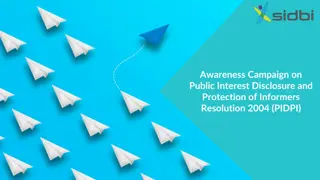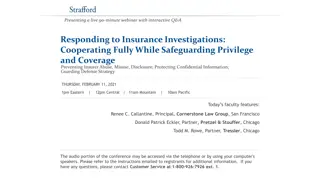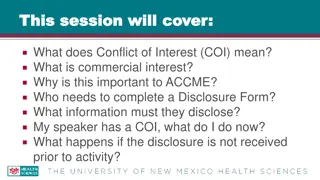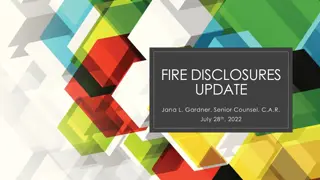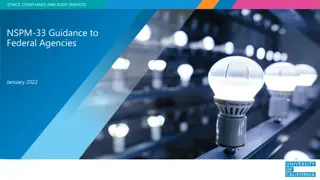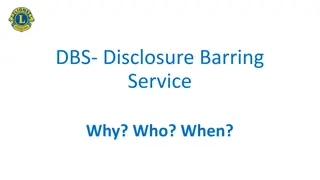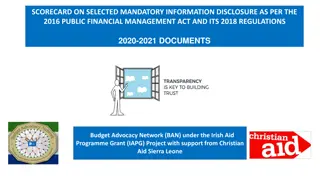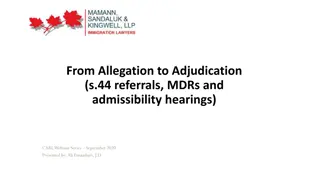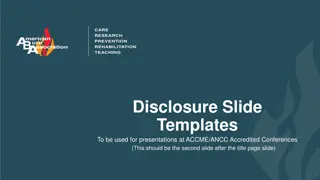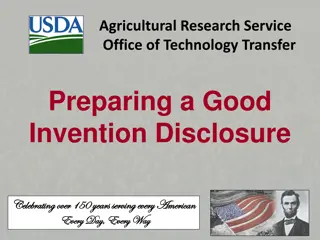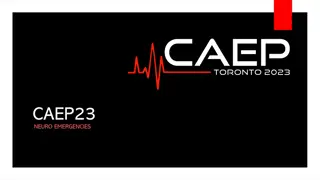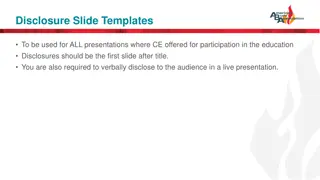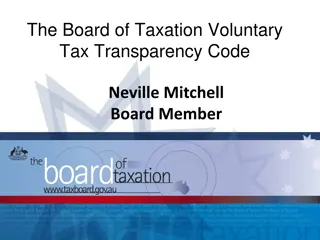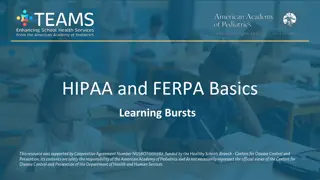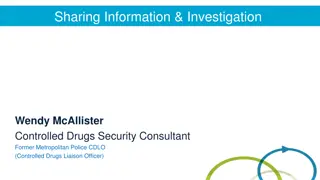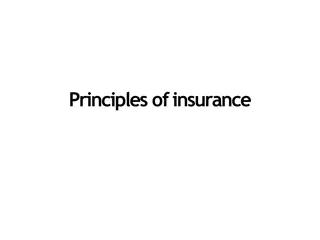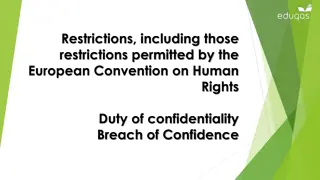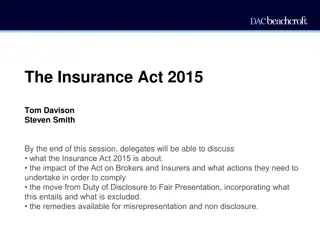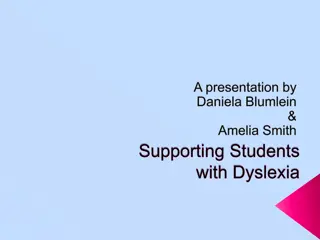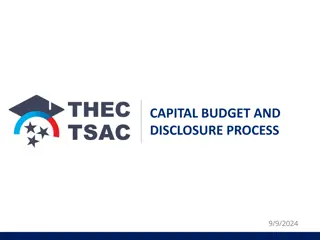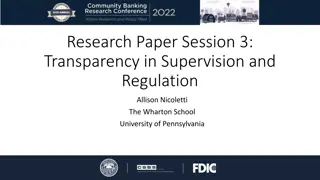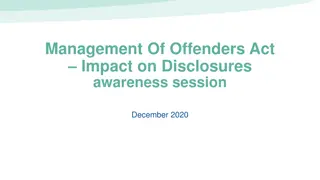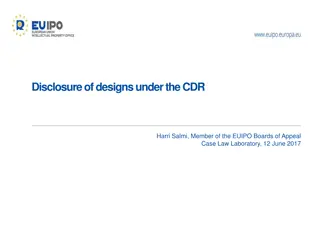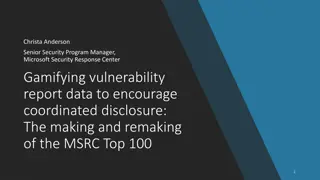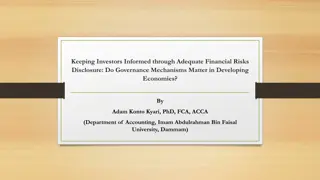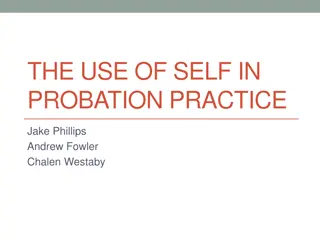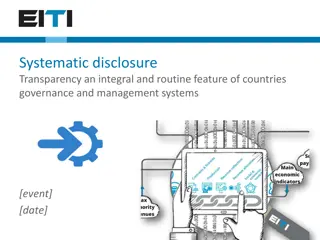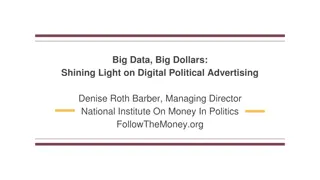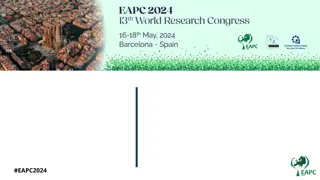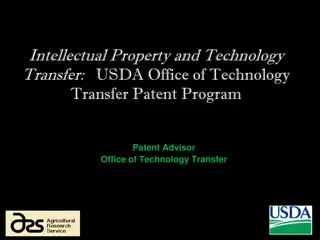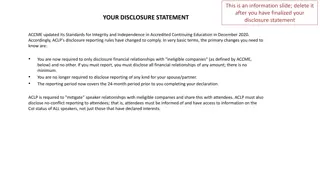Understanding Financial Disclosure and Lifestyle Audits Frameworks
The financial disclosure framework was introduced in 2016 by the Minister for the Public Service and Administration to manage conflict of interest situations in the public service. Designated employees disclose their financial interests annually via the eDisclosure system, and these disclosures are
2 views • 11 slides
Public Interest Disclosure and Protection of Informers Resolution 2004 (PIDPI) Guidelines
Public Interest Disclosure and Protection of Informers Resolution (PIDPI) provides a mechanism for individuals to blow the whistle on corruption and seek protection. Complaints must be sent via post to the Central Vigilance Commission and should not reveal the complainant's identity. Specific guidel
0 views • 6 slides
Insurance Investigations: Handling Privilege, Coverage, and Disclosure
Explore the nuances of responding to insurance investigations in this 90-minute interactive webinar. Learn how to cooperate effectively while protecting privilege, coverage, and confidential information. Gain valuable insights on preventing insurer abuse, misuse, and disclosure, as well as safeguard
0 views • 52 slides
Understanding Conflict of Interest in ACCME Accredited Activities
Conflict of Interest (COI) refers to financial relationships that may create biases in Continuing Medical Education (CME) activities when individuals have ties to commercial interests and can influence the content. ACCME requires disclosure to prevent potential bias in CME content. Non-disclosure ca
0 views • 18 slides
Real Estate Fire Disclosures and Defensible Space Updates
Updates on fire hardening, defensible space disclosure, and addendum requirements in real estate transactions. Includes revisions to disclosure questions, defensible space decision tree, and wildfire disaster advisory. Resources for maximizing member legal services are also highlighted.
0 views • 7 slides
Federal Agencies Guidance on Ethics, Compliance, and Audit Services under NSPM-33
The White House OSTP released guidance for federal agencies to implement NSPM-33 focusing on disclosure requirements, digital identifiers, consequences for violations, information sharing, and research security programs. The guidance emphasizes supporting open scientific inquiry and nondiscriminator
0 views • 10 slides
Understanding DBS (Disclosure & Barring Service): Purpose, Process, and Categories
The Disclosure and Barring Service (DBS) is a critical aspect of ensuring safe recruitment decisions, particularly for roles involving children and vulnerable adults. This service helps organizations across sectors in England and Wales identify unsuitable candidates by providing access to criminal r
0 views • 14 slides
Scorecard on Mandatory Information Disclosure under 2016 Public Financial Management Act
The Scorecard on Mandatory Information Disclosure analyzes compliance with the 2016 Public Financial Management Act in Sierra Leone. The report shows that 23% of required documents are not produced, 24% of produced documents are not published, and highlights key findings to improve transparency and
0 views • 15 slides
Section 44 Process in Immigration Adjudication
The process from allegation to adjudication in immigration cases involves Section 44 referrals, MDRs, and admissibility hearings under IRPA. Officers have discretion to write reports or issue removal orders based on inadmissibility opinions. Procedural fairness is essential, including providing deta
0 views • 19 slides
Disclosure Slide Templates for ACCME/ANCC Accredited Conferences
These disclosure slides are designed for presentations at ACCME/ANCC Accredited Conferences. They include templates for disclosing conflicts of interest, grant/research support, speaker bureau affiliations, consultant roles, major shareholder status, off-label medication discussions, and more. Use t
1 views • 4 slides
Agricultural Research Service: Invention Disclosure Guidelines
An Invention Disclosure is a confidential document prepared by inventors to describe new inventions in detail, including problem-solving aspects, commercial potential, technological significance, and more. It helps in determining patentability and guiding the patent application process.
0 views • 27 slides
Managing Neuro Emergencies: Faculty Disclosure and Financial Support
This presentation focuses on neuro emergencies with insights from faculty disclosure of financial relationships with sponsors and organizations. It also highlights financial support received and the mitigation of potential bias in the content.
0 views • 10 slides
Comprehensive Disclosure Guidelines for CE Presentations
Ensure proper disclosure in CE presentations by using the provided templates for financial relationships, conflicts of interests, and off-label medication discussions. These guidelines cover disclosing ineligible companies, nature of financial relationships, and off-label medication use. Adhere to t
4 views • 4 slides
The Board of Taxation Voluntary Tax Transparency Code Overview
The Board of Taxation developed a voluntary Tax Transparency Code to address community concerns and promote greater tax transparency among large businesses. The Code outlines recommended disclosures for both large and medium businesses, encouraging adoption of higher disclosure standards. Internatio
0 views • 20 slides
Understanding HIPAA and FERPA Privacy Laws in Schools
Collaboration between community and school health care providers involves adherence to federal privacy laws such as FERPA and HIPAA. FERPA protects educational records and personally identifiable information (PII), requiring written consent for disclosure. HIPAA safeguards protected health informati
1 views • 14 slides
Healthcare Professionals and Controlled Drugs: Regulations and Responsibilities
Wendy McAllister, a former Metropolitan Police CDLO, provides insight on managing situations involving healthcare professionals and controlled drugs. The discussion covers scenarios such as substance abuse by pharmacists, nurses, and doctors, along with legal implications and cooperation mandated by
0 views • 14 slides
Key Principles of Insurance
Understanding insurable interest, utmost good faith, and material facts disclosure are essential principles in the insurance industry. Insurable interest requires a financial stake in the insured property, utmost good faith mandates honesty in the contract, and material facts disclosure ensures all
0 views • 22 slides
Understanding Related Party Transactions in Corporate Governance
Related Party Transactions (RPT) are vital in today's business world, ensuring transparency and disclosure in transactions involving parties related to the company. This article explores the significance of RPT, definitions under CA 2013 and SEBI LODR 2015, as well as the identification criteria as
0 views • 30 slides
Understanding Breach of Confidence and Privacy Rights in English Law
English law does not provide a specific right to privacy, but breach of confidence laws offer protection against unauthorized disclosure of private information. While there is no overarching invasion of privacy tort, legal controls exist to balance freedom of expression with respect for individual p
0 views • 18 slides
Understanding the Impact of the Insurance Act 2015 on Brokers and Insurers
The Insurance Act 2015 brings significant changes in insurance contract law, shifting from Duty of Disclosure to Fair Presentation. This Act influences both Brokers and Insurers, requiring clear and accessible disclosure of material circumstances. The remedies for misrepresentation and non-disclosur
0 views • 19 slides
Supporting Students with Dyslexia: Understanding, Disclosure, and Reasonable Adjustments
This presentation covers important aspects of supporting students with dyslexia, including defining disability, understanding dyslexia, the choice of disclosure, obligations under the Equality Act 2010, and suggestions for reasonable adjustments and support to help dyslexic students succeed in their
0 views • 12 slides
Updated Disclosure Rules for Financial Relationships in Continuing Education
ACCME updated its Standards for Integrity and Independence in Continuing Education, requiring disclosure of financial relationships with specific "ineligible companies" by all involved parties. The rules aim to enhance transparency and mitigate conflicts of interest in accredited continuing educatio
1 views • 5 slides
Understanding Disability Disclosure in Employment: Practical and Ethical Considerations
This presentation touches on the practical and ethical issues supported employment professionals face when dealing with disability disclosure. The agenda includes ADA provisions, successful disclosure strategies, the professional's role in the process, and available resources. The session covers dis
0 views • 33 slides
Understanding Disclosure of Adverse Clinical Events in Healthcare
Exploring the essential elements of disclosing adverse clinical events to patients and families in healthcare settings. It covers why disclosure is crucial, barriers to disclosure, triggers for disclosure, policies and procedures, and the other important aspects related to the disclosure process.
0 views • 8 slides
Understanding the Capital Budgeting and Disclosure Process
This content provides a comprehensive overview of the capital budgeting and disclosure process, focusing on fiscal years, budget terms, and the sequential steps involved in the capital budget process. It explains the timeline from the Governor's capital budget release to the final approval by the go
2 views • 23 slides
Example of COI Disclosure Formats in Academic Presentations
These images provide examples of Conflict of Interest (COI) disclosure formats for oral and poster presentations in academic settings. They outline how authors can disclose any potential COIs in relation to their work over the past three years, including details on employment, stock ownership, paten
1 views • 4 slides
Detailed Guidance and Requirements for Implementing NSPM-33
The update provides detailed guidance on implementing NSPM-33's disclosure requirements and other provisions discussed in the January 2022 CLASP Meeting. It includes areas such as disclosure requirements, digital persistent identifiers, consequences for violations, information sharing, and research
1 views • 19 slides
Transparency in Banking: Examining Disclosure and Regulation
Discussion on the importance of transparency in the banking industry, focusing on the level of information disclosure by banks and its impact on market discipline, lending practices, and regulatory intervention. Papers explore different facets of transparency, including the disclosure audience, natu
0 views • 10 slides
Evolution of Vulnerability Disclosure Practices
The history of vulnerability disclosure, from the early days of mailing lists and zines to the emergence of Full Disclosure and the debates around anti-disclosure groups. The timeline covers key events like the Morris worm, Code Red, the founding of Bugcrowd, and more, illustrating the evolution of
0 views • 11 slides
Impact of Management of Offenders Act on Disclosure Awareness Session
On 30 November 2020, new legislation including the Age of Criminal Responsibility (Scotland) Act 2019 and the Management of Offenders (Scotland) Act 2019 came into force, transforming the disclosure system in Scotland. These changes raise the age of criminal responsibility, reduce rehabilitation per
0 views • 10 slides
Understanding Disclosure of Designs under CDR - Key Insights
The article explores the disclosure of designs under the Community Design Regulation (CDR) and Community Design Invalidity Regulation (CDIR). It discusses the criteria for public availability, evidence required for proving prior disclosure, and the basic rules for establishing the disclosure of a pr
0 views • 9 slides
Gamifying Vulnerability Reporting for Coordinated Disclosure at Microsoft Security Response Center
Christa Anderson, a Senior Security Program Manager at Microsoft's Security Response Center, discusses the importance of gamifying vulnerability report data to encourage coordinated disclosure. The MSRC Top 100, announced at Black Hat USA, plays a crucial role in the public credit strategy by recogn
0 views • 13 slides
Governance Mechanisms and Financial Risks Disclosure in Developing Economies
Examining the impact of governance mechanisms on financial risk disclosure in developing economies, this study delves into theories, literature reviews, findings, policy implications, and conclusions. The research emphasizes the importance of adequate risk disclosure for investor trust and regulator
0 views • 9 slides
The Use of Self in Probation Practice: Understanding Self-Disclosure and Its Implications
Explore the concept of self-disclosure in probation practice, examining different methods, findings, and implications. Discover the two schools of thought regarding self-disclosure and delve into the various realms and subtypes of self-disclosure practices. Gain insights into the forms of self-discl
0 views • 25 slides
Understanding Cultural Influence on Delayed Child Sexual Abuse Disclosure in the Vhavena Tribe
Exploring the intersection of culture, tradition, and delayed disclosure of child sexual abuse within the Vhavena Tribe. The study delves into the complexities of disclosure, the unique context of CSA in cultural norms, and behaviors, guided by the Afrocentric theory. Methodology involves interviews
0 views • 15 slides
Enhancing Governance through Systematic Disclosure and Transparency
Systematic disclosure and transparency play a crucial role in the governance and management systems of countries. This involves routine disclosure of information, such as financial data, to promote accountability and address gaps in information. The EITI Standard emphasizes the importance of mainstr
0 views • 23 slides
Shining Light on Digital Political Advertising
Explore the impact of big data on digital political advertising and the importance of transparency in campaign contributions. Discover key insights from court rulings and perspectives from Justice Scalia and Justice Kennedy on disclosure in political speech. Learn why timely, accessible, and digital
0 views • 10 slides
Conflict of Interest Disclosure for EAPC 2024 Congress
This disclosure statement outlines the conflict of interest policy for speakers at the EAPC 2024 Congress. Speakers are required to disclose any affiliations or financial interests that may potentially influence their presentations. The purpose of the disclosure is to inform attendees so they can ev
0 views • 4 slides
USDA Office of Technology Transfer Patent Program Overview
USDA Office of Technology Transfer's Patent Program provides professional services for creating, managing, and convening Utility Patent Review Committees, preparing and prosecuting U.S. patent applications, advising on patent policies, and facilitating foreign filings. The process for protecting USD
0 views • 24 slides
New Disclosure Rules for Continuing Education
ACCME updated its Standards for Integrity and Independence in Accredited Continuing Education in December 2020, leading to changes in ACLP's disclosure reporting rules. Key changes include reporting only financial relationships with "ineligible companies," extending the reporting period to 24 months
0 views • 5 slides

